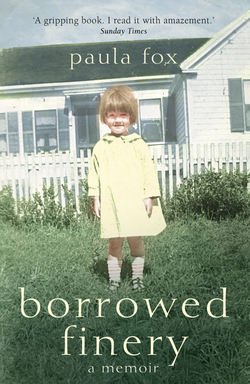Читать книгу Borrowed Finery - Paula Fox - Страница 6
BORROWED FINERY
ОглавлениеWhen I was seventeen, I found a job in what was then downtown Los Angeles in a store where dresses were sold for a dollar each. The store survived through its monthly going-out-of-business sales.
Every few days I was required to descend to the basement to bring up fresh stock to replace what had been sold. It was a vast space, barely lit by a weak bulb hanging from a low ceiling, and appeared to extend beyond the boundaries of the store itself. In its damp reaches I sometimes glimpsed a rat shuttling along a pipe, its naked tail like an earthworm.
Against one wall, piled up on roughly carpentered wood shelves, were flimsy boxes of dresses. In front of the opposite wall was an enormous cardboard cutout, at least ten feet high, of Santa Claus, his sled, and his reindeer. I guessed this was displayed in the store upstairs at Christmastime.
One morning when I was sent to the basement for dresses, I noticed drops of sweat on Santa’s brow. Later it occurred to me that the pipe along which I’d seen rats running extended over the cutout, and leaks could account for the appearance of sweat. But at the time I imagined it was because of his outfit. He was as inappropriately dressed for the California climate as I was in my thick blue tweed suit.
I’ve long forgotten who gave the suit to me. I do recall it was a couple of sizes too big and sewn of such grimly durable wool that the jacket and skirt could have stood upright on the floor.
I earned scant pay at a number of jobs I found and lost that year, barely enough for rent and food with nothing to spare for clothes. What I owned in the way of a wardrobe could have fitted into the sort of suitcase now referred to in luggage ads as a “weekender,” a few scraps that would cover me but wouldn’t serve in extremes of weather—and, of course, the blue tweed suit that I wore to work in the Los Angeles dress store day after day.
In that time I understood mouse money but not cat money. Five dollars were real. I could stretch them so they would last. I was bewildered even by the thought of fifty dollars. How much was $50?
The actress ZaSu Pitts, in a publicity still—an advertisement for the movie Greed made in 1923, the year I was born, that showed her crouching half naked among heaps of gold coins, an expression of demented rapacity on her face—embodied my view of American capitalism when I was a young girl. As I grew older, my attitude about money changed. I began to see how complex it was, how some people accumulate it for its own sake, driven by forces as mysterious to me as those that drive termites to build mounds that attain heights of as much as forty feet in certain parts of the world.
At the same time that I began to acquire material things, my appetite for them was aroused. Yet in my mind’s eye, the image of ZaSu Pitts holding out handfuls of gold coins, not offering them but gloating over her possession of them, persists, an image both condemnatory and triumphant.
